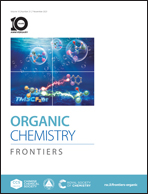Palladium-catalyzed C(sp3)–Si cross-coupling silylation of benzyl halides with hydrosilanes†
Abstract
Catalytic construction of the silicon–carbon bond is one of the most important processes in organosilicon chemistry and remains an ongoing challenge in homogeneous catalysis. Herein, we report an unprecedented and convenient palladium-catalyzed Si–C(sp3) bond-forming cross-coupling silylation of benzyl halides with structurally diverse hydrosilanes. This provides a direct and chemoselective approach to the facile synthesis of various silanes and their derivatives with moderate-to-good yields. The phosphine-controlled and B(C6F5)-assisted Pd-catalyzed C(sp3)–Si cross-coupling silylation exhibited good tolerance for functional groups and demonstrated the powerful potential of the silicon-based cross-coupling reaction for preparation of structurally diverse benzyl silanes. This protocol also featured simple reaction conditions, wide substrate scope and high chemoselectivity, and was environmentally benign. This protocol could offer a new pathway for the synthesis of tri- or tertiary-substituted functional organosilicon compounds.



 Please wait while we load your content...
Please wait while we load your content...